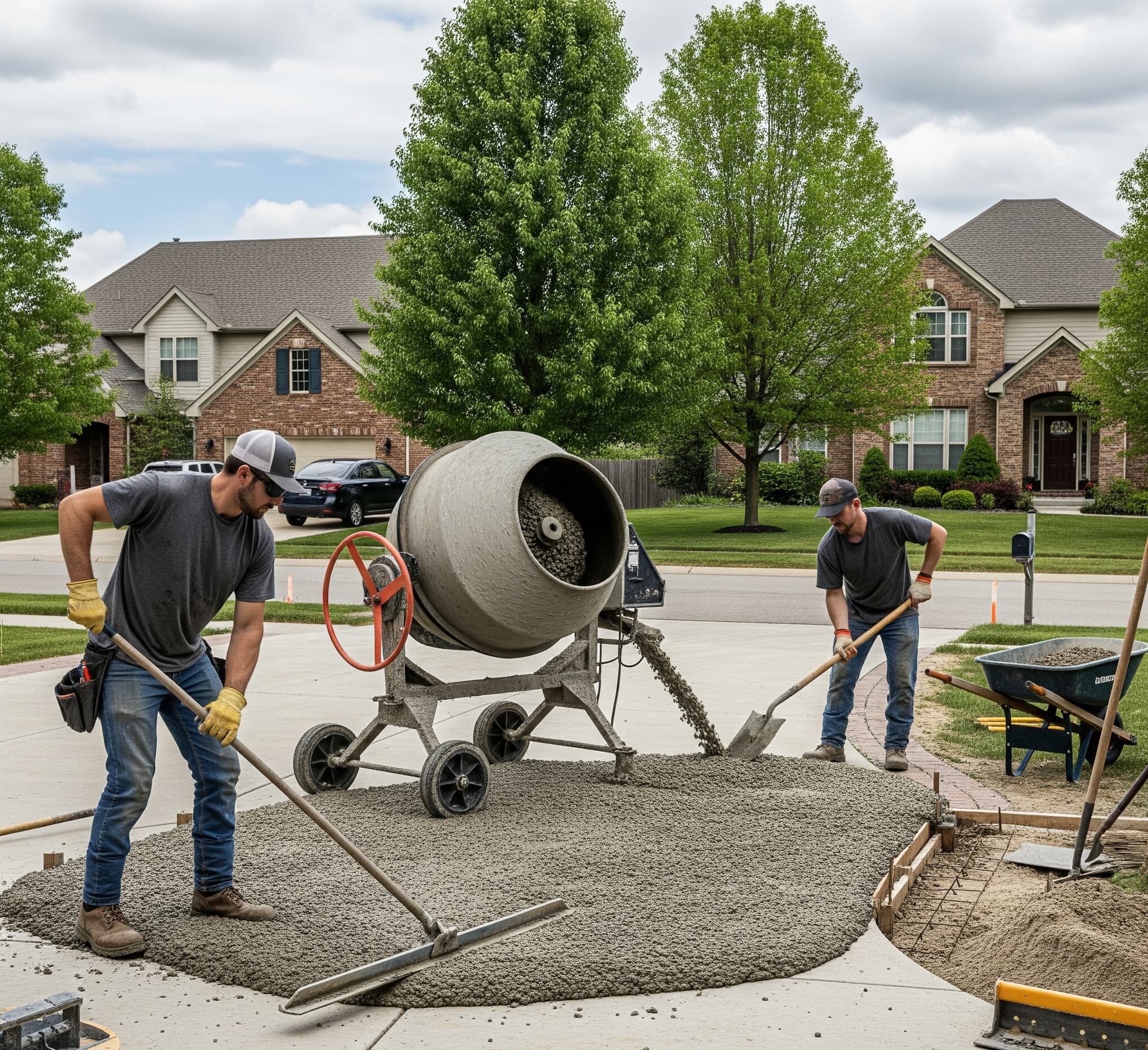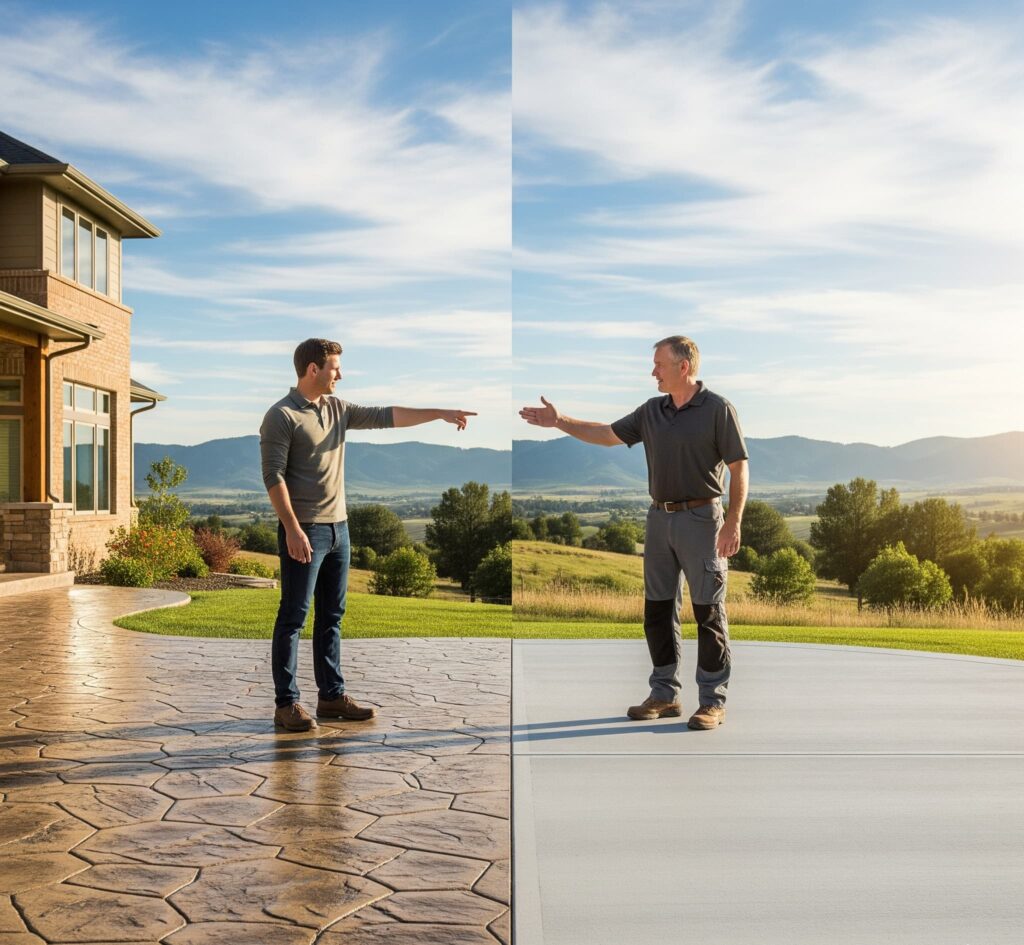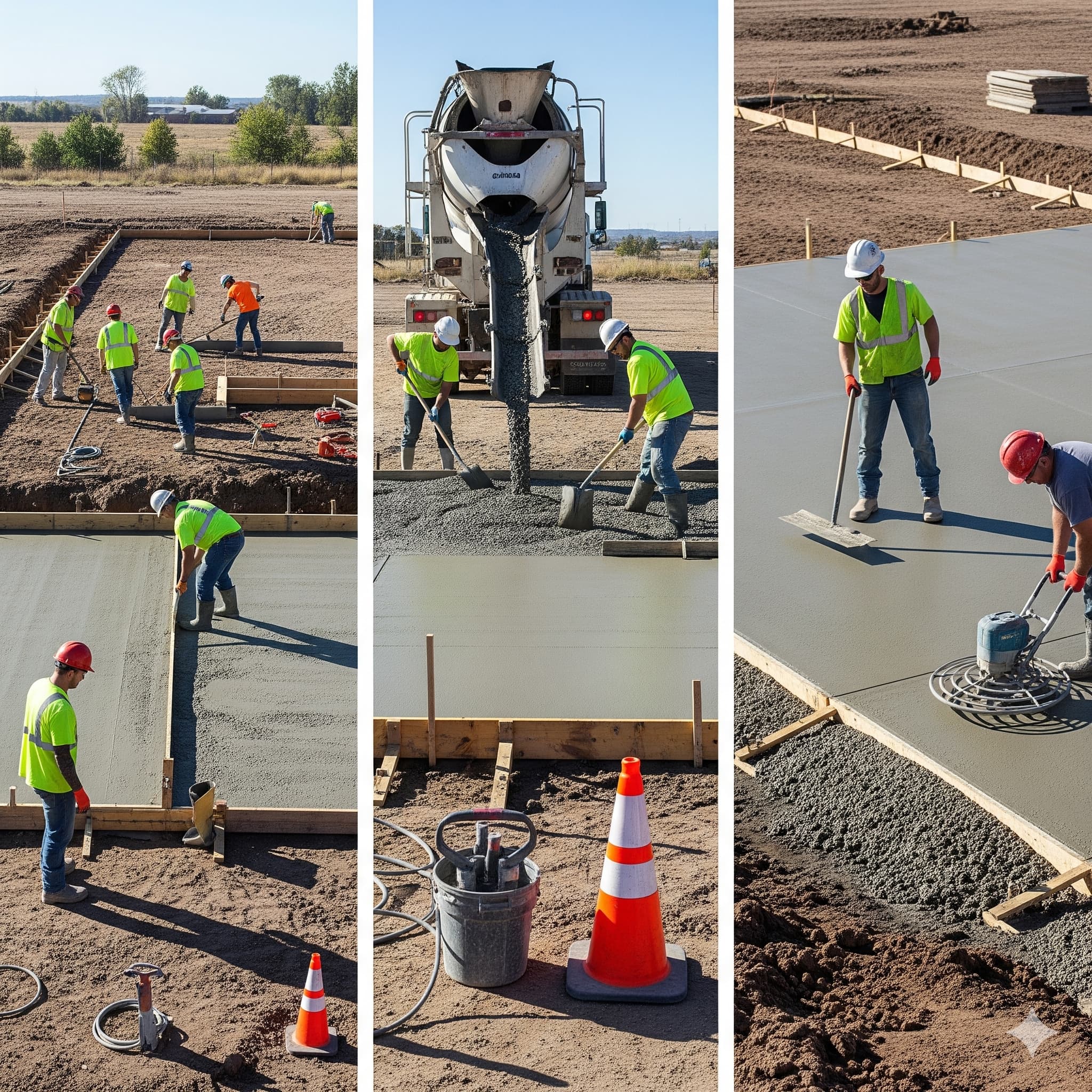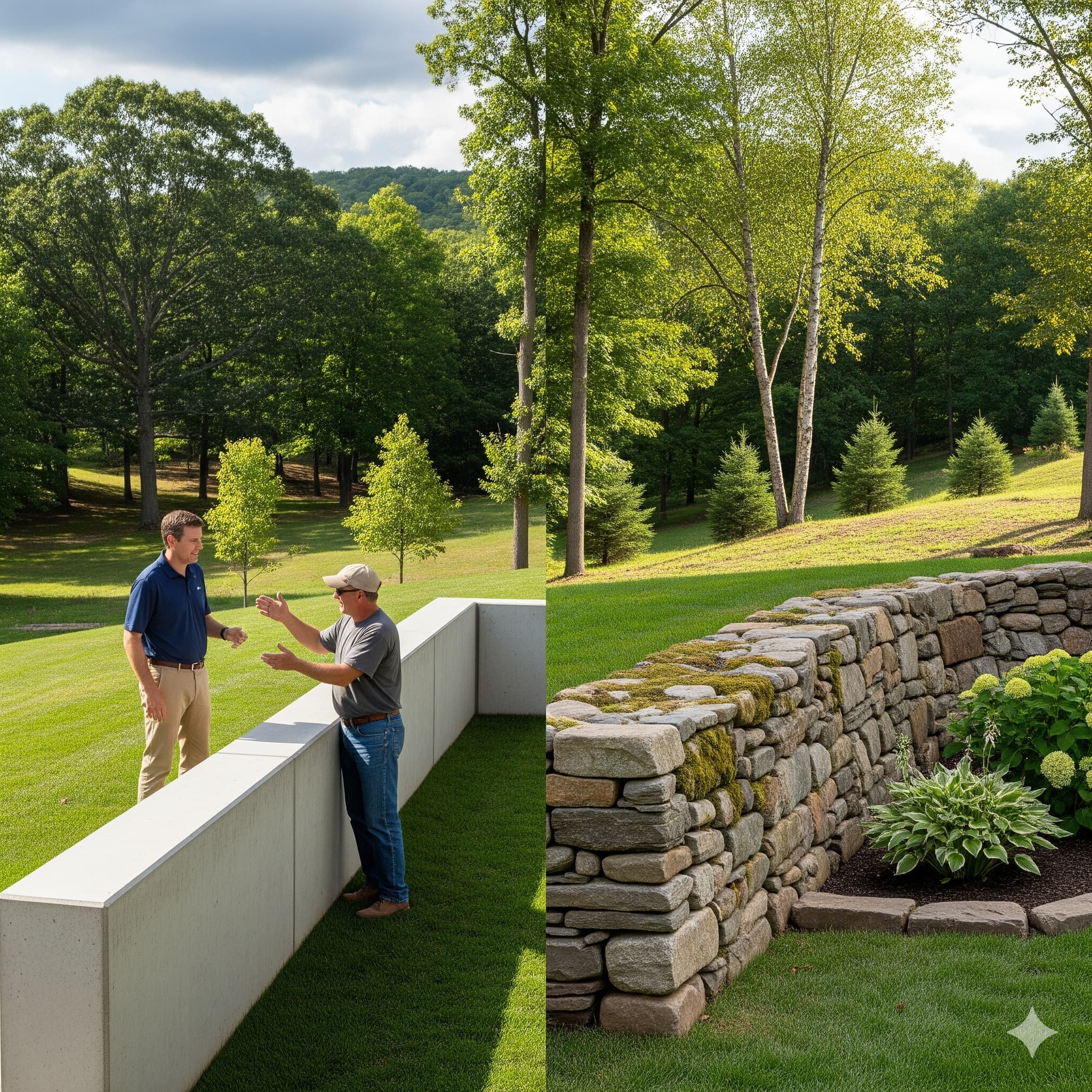
Stamped vs. Plain Concrete: Making the Right Choice for Your New Haven Home
Key Differences Between Stamped and Plain Concrete
Choosing between stamped concrete and plain concrete for your New Haven property involves weighing aesthetic preferences, budget considerations, and long-term maintenance requirements. Homeowners near scenic areas like West Rock Ridge State Park and the Farmington Canal Heritage Trail increasingly recognize that the right concrete choice significantly impacts both property value and outdoor living enjoyment for decades to come.

Understanding Stamped Concrete Benefits
Stamped concrete is an affordable way to transform your ordinary concrete surfaces into beautiful, textured reproductions of natural stone, brick, slate, or wood. The stamping process is used to reproduce the look and feel of natural materials, and this creates a durable, functional product that is strong, yet aesthetically pleasing. In addition to offering a wide variety of design options, stamped concrete is also cost-effective and easy to install. In New Haven, we have many homes with historic charm as well as modern homes with a desire for new looks. No matter which type of home you own, our professional stamped concrete design team will help you find the right design option to fit your architectural style and your lifestyle.
Design Options and Pattern Choices
Our team of experts has worked with hundreds of patterns, colors, and textures to offer endless design options for stamped concrete. Your choices are limitless in terms of how you want to decorate your home. For example, if you live near the Farmington Canal Heritage Trail and want to give your home a classic look, you can choose a flagstone pattern. If you prefer to have a more rustic look and live in one of New Haven’s older neighborhoods, you can choose a cobblestone pattern. Our design team allows you to customize your stamped concrete design so that it fits your personality and meets your needs.
Customized Border Treatments Create Focal Points
In addition to choosing a specific pattern, you can also add custom border treatments to create a focal point in your home. Whether you want to highlight your driveway, sidewalk, or patio, our design team can help you create a customized design that complements your home and fits your budget.
Affordable Luxury Look
One of the biggest advantages of using stamped concrete is that it offers an affordable luxury look. Compared to installing actual brick, stone, or slate, you can save up to 40-60% of the cost by using stamped concrete. However, the cost difference is not always significant. For example, depending on the complexity of the design, you can expect to pay anywhere from $3-$8 more per square foot for stamped concrete than for plain concrete. However, since you get a high-end look without the premium price tag, this can be an ideal solution for homeowners who want to create a luxurious look without breaking the bank.
Benefits of Using Plain Concrete
While stamped concrete offers a wide array of design options and a high-end look, there are times when plain concrete is the best option. For example, when a homeowner wants to cover a large area with a functional, low-cost material that is not concerned with aesthetics, plain concrete is usually the better option. On average, plain concrete costs $6-$12 per square foot and provides the homeowner with a functional and durable product that is great for driveways, sidewalks, and utility areas. Since plain concrete is easy to install and does not require specialized skills or equipment, it is a good option for homeowners on a tight budget who need to cover a lot of space.
Low-Maintenance Solution
Another benefit of using plain concrete is its low-maintenance requirements. Once the concrete is installed, the only thing you need to do to keep it looking its best is to occasionally clean it and apply a protective sealer every three to five years. With regular maintenance, the surface will remain smooth and even and last for decades. Many homeowners in the New Haven area choose to install plain concrete around their pools, patios, and walkways because of its durability and low-maintenance requirements.
Repairing Plain Concrete
When repairing plain concrete, you simply need to clean the damaged area and fill it with a concrete patching compound. Once the patch dries, you can sand it down to a smooth finish and paint it to match the rest of the concrete. Because plain concrete is a uniform material, the repair blends in seamlessly with the surrounding area and is hardly noticeable. Additionally, unlike decorative stamped concrete, you don’t need to worry about finding a matching color or texture to blend in with the original design. This makes repairs much easier and less expensive than they would be otherwise.
Budgeting and Cost Comparison
When comparing the cost of stamped concrete to plain concrete, it is essential to consider the total cost of ownership rather than just the initial installation cost. Although the initial installation cost of stamped concrete may be higher than plain concrete, the added value to your property and the enjoyment you derive from having a beautiful exterior space often justifies the extra cost. As a general rule, the cost of installing stamped concrete ranges from $9-$15 per square foot. More elaborate designs that incorporate multiple colors and intricate patterns can cost upwards of $18-$25 per square foot.
Return on Investment
According to Remodeling Magazine, professional stamped concrete installations typically recover 70-80% of their installation costs in increased property values. This means that if you spend $10,000 on a stamped concrete job, you can expect to recover $7,000 to $8,000 of that amount when you sell your house. The beauty of stamped concrete is that it adds instant curb appeal to your property and sets it apart from other homes in your neighborhood. It also makes your home more attractive to potential buyers, and therefore, it can sell faster and for more money.
Comparison of Long-Term Costs
As previously stated, stamped concrete is generally considered to be more cost-effective than plain concrete over the course of a 15-20 year period. This is largely because the initial investment in stamped concrete is recovered through increased property values. However, it’s worth noting that while plain concrete may seem to be cheaper at first, you may need to replace or refinish it after a certain number of years, depending on how well it holds up to the elements. Therefore, although the initial cost may be lower, you could end up spending more money overall. Conversely, while stamped concrete may cost more upfront, it tends to hold up better over time and requires less maintenance to keep it looking its best.
Maintaining Stamped Concrete
To maintain the beauty of your stamped concrete, you will need to periodically re-seal it. The frequency of re-sealing depends on several factors, such as the amount of sun it receives, the amount of traffic it gets, and whether it is exposed to harsh chemicals. Generally speaking, it is recommended to re-seal your stamped concrete every two to three years. You should also gently clean your stamped concrete to remove dirt and debris and avoid using abrasive cleaners or acid-based products that could damage the surface. In addition, you should re-seal your stamped concrete regularly to protect the surface from damage caused by the elements. Finally, if you plan to use your stamped concrete frequently, especially for events or gatherings, you may want to seal it more often to protect the surface.
Maintaining Plain Concrete
As previously mentioned, maintaining plain concrete is relatively simple. To keep your plain concrete looking its best, you should periodically clean it to remove dirt and debris and apply a protective sealer to the surface every three to five years. This will help to prevent water from penetrating the surface and causing damage. Also, it’s worth noting that you can use pressure washers or abrasive cleaners to clean your plain concrete without worrying about damaging the surface. Additionally, plain concrete tends to hold up well to harsh chemicals and extreme temperatures, making it a durable and low-maintenance option for many homeowners.
Impact of Climate
Regardless of the type of concrete you decide to install, the climate in Connecticut will have an impact on its performance and maintenance. Specifically, the state’s variable climate, which includes freezing temperatures and thawing precipitation, as well as warm summer months, can cause the concrete to expand and contract. When designing and installing your concrete, it is essential to take these climate-related factors into consideration and to select a material and design that will accommodate them. Both stamped and plain concrete can withstand the extreme temperatures and moisture fluctuations found in Connecticut’s climate, but stamped concrete requires special sealants that provide UV protection and moisture resistance while preserving the decorative appearance of the surface.
Factors Affecting Seasonal Performance
During the winter months, both stamped and plain concrete can be damaged by de-icing salts and other chemicals used to melt ice and snow. However, stamped concrete is more susceptible to this type of damage and requires the use of non-corrosive alternatives to protect the decorative surface and color. Stamped concrete also requires more frequent sealing during the warmer months to protect the surface from damage caused by sunlight and moisture. In contrast, plain concrete is more resistant to damage from de-icing salts and other chemicals and can tolerate standard de-icing materials without sustaining any permanent damage. However, to prevent scaling and surface deterioration, plain concrete should still be sealed to protect the surface from moisture penetration and freeze-thaw cycles.
Recommendations Based on Project-Specific Needs
The decision to install stamped or plain concrete ultimately depends on the specific needs of your project. Depending on the location, usage, and desired appearance, either type of concrete can be used. In some cases, a single project may require both stamped and plain concrete. For example, a homeowner may wish to install a stamped concrete patio in their backyard, but a plain concrete driveway outside. Similarly, a homeowner may wish to install a plain concrete sidewalk along the side of their home, but a stamped concrete entranceway to greet visitors.
Decorative vs. Functional Uses
Whether or not to use decorative stamped concrete versus plain concrete ultimately comes down to the purpose of the space. Decorative stamped concrete is ideal for areas that receive heavy foot traffic, such as front entrances, patios, and entertainment areas. These areas tend to be highly visible and therefore deserve the decorative treatment to enhance their appearance and increase the overall value of the property. In contrast, areas that serve a purely functional purpose, such as driveways, sidewalks, and utility areas, can be installed with plain concrete. While plain concrete lacks the visual appeal of stamped concrete, it is a more cost-effective solution for larger areas that are not as highly visible.
Importance of Hiring a Skilled Contractor
Both stamped and plain concrete can be installed by unskilled individuals; however, only a skilled contractor can guarantee a successful installation. When hiring a contractor, look for someone who has previous experience working with both stamped and plain concrete. Ask for referrals from friends, family members, or neighbors, and check online reviews. Make sure the contractor has all necessary licenses and certifications, and ask to see examples of their previous work. By hiring a skilled contractor, you can be assured that your installation will turn out perfectly and that the final result will last for many years.
Workmanship and Quality
Regardless of the type of concrete you install, the importance of good workmanship cannot be overstated. Poorly installed concrete, whether it is stamped or plain, can lead to cracks, unevenness, and poor drainage. At New Haven Concrete Company, we take pride in our workmanship and strive to deliver high-quality installations that meet or exceed industry standards. We understand that the success of your installation depends not only on the materials used, but also on how those materials are applied. That is why we employ experienced professionals who are committed to delivering top-notch services to our customers.



